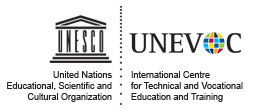Greening TVET, Job roles, and Curricula
New Delhi, 4-8 March 2019

The transition towards green economies has a profound impact on the labour market. An IRENA report in 2018 found that 10.3 million new jobs in the renewable energy sectors were created in 2017, an increase of 5.3% compared to the previous year. This trend is continuing on a global scale. It is estimated that a transition to more sustainable economies could generate up to 60 million new jobs worldwide over the next two decades. (ILO 2017)
Technical and Vocational Education and Training (TVET) is not isolated from these changes, and the transition towards green economies offers the TVET system the opportunity to adapt the curriculum to provide relevant skills. In 2017, UNESCO-UNEVOC published the Greening Technical and Vocational Education and Training: a practical guide for institutions, which serves as a global reference for managers, leaders, and teachers in transforming their institutions to respond to these challenges. TVET stakeholders are encouraged to adopt a whole-institutional approach to greening. This includes teaching content and methodology, school governance and cooperation with the broader community, and campus and facility management. Five approaches are outlined, two of which focus on greening the curriculum and training and greening the community and workplace. Although targeted at institutions, these approaches are indeed relevant to ministries and national bodies.

To assist UNEVOC Centres in the implementation of Greening TVET, UNESCO-UNEVOC, jointly with the National Skills Development Corporation (NSDC) – a new UNEVOC Centre in India – has co-organized a five-day workshop. The workshop will look into situating TVET in the global sustainability agenda, the implications of green transitions to occupations and training, including development of standards and curricula, assessment of skills and anticipation of skills demand. Participants will have the opportunity to:
- examine the concepts, approaches, and best practices of greening TVET followed by an assessment of ground realities;
- share the different approaches of greening TVET standards and curricula;
- evaluate the aspects of teaching and assessing green skills and competencies; and
- gain practical insights on green skills development in specialized field areas (i.e., energy, environment)

At the end of the five-day workshop, Dr. Shyamal Majumdar, Head of UNESCO-UNEVOC will lead participants in reflecting upon the information shared and discuss the strategic direction and practical application moving forward, drawing from the rich week-long interactive discussions that also involved the ILO India, TERI School of Advanced Studies, JET Education Services - South Africa, University of Witwatersrand - South Africa and the National Institute of Urban Affairs- India.
List of participating UNEVOC Centres/institutions
| National Board for Technical Education (NBTE) | Nigeria |
| TVET Authority (TVETA) | Kenya |
| Council for TVET (CTVET) | Guyana |
| Colleges and Institutes Canada | CICan |
| Tertiary and Vocational Education Commission (TVEC) | Sri Lanka |
| Pandit Sunderlal Sharma Central Institute of Vocational Education (PSSCIVE) | India |
| Education University of Hong Kong (EdUHK) | Hong Kong PRC |
| TEVET Authority (TEVETA) | Zambia |
| Bangladesh Technical Education Board (BTEB) | Bangladesh |
| National Technical Training Institute (NTTI) | Cambodia |
| Ministry of Education | Maldives |
| National College of Technical Professional Education (CONALEP) | Mexico |
| Universiti Tun Hussein Onn | Malaysia |
| Maldives Polytechnic | Maldives |
| Department of Technical Education, MOLHR | Bhutan |
